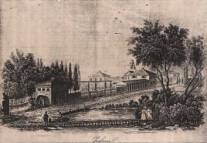|
|
|
|
Michał Kleofas Ogiński
|
|

|
Prince Michał
Kleofas Ogiński was born in Guzów, near Warsaw, the capital of the
Polish-Lithuanian Commonwealth, in 1765. Although he was groomed as a
diplomat to follow in his father Andrzej’s footsteps, he learned the
piano from Józef Kozłowski, and the violin initially from Giovanni
Giornovichi, then, later, from Viotti. Despite his precocious talent for
improvisation at the piano, being an aristocrat, there was never any
question of a career in music. Aged only 21, he was elected to the Seym,
the Polish Parliament, and the following year he married Izabela Lasocka
of Brzeziny, central Poland. His first diplomatic mission in 1789 was to
the Hague and London.
He returned to
Warsaw, where he continued his political activities. His piano
improvisations, notably of Polonaises for listening, rather than
dancing, became very popular for their taste, melodic invention and
delicacy. His first major success, which won him international fame, was
the Polonaise No 1 in F, the so-called Polonaise
of Death (it coincided with a totally unfounded rumour that he had
committed suicide as a result of a doomed love affair!).
|
|
Michał Kleofas Ogiński
by Józef Grassi
|
|
During the War of the Polish Partitions, which Ogiński
called the Polish Revolution, he fought under Kościuszko against the
forces of Catherine the Great by leading a commando unit in northern
Lithuania, where he wrought havoc with Russian supply
lines. Ultimately,
the war was lost, and the Polish-Lithuanian Commonwealth was partitioned
by Russia, Prussia and Austria, and ceased to exist. Ogiński, who had
earned a Russian price on his head, escaped to Vienna disguised a grand
lady’s servant. He spent the next five years in penniless exile,
travelling to Italy, Constantinople, the Balkans and everywhere else in
Europe, ending up in Paris, seeking the restoration of the Polish state
by diplomatic means. Ultimately he failed, but was able to rejoin his
wife, Izabela, at her parents’ estate at Brzeziny, now in
Prussia,
where their two sons, Tadeusz
and Franciszek Ksawery – known as Xavier – were born in 1800 and 1801 respectively.
When Tsar Alexander I ascended the Russian throne that same year, Ogiński,
whose marriage to Izabela had disintegrated and ended in divorce, sought
his permission to return to whatever would pass for home. The Tsar
readily agreed, and Ogiński was not only rehabilitated but was
appointed senator at the Court of St Petersburg. He was able to reclaim
his family estate at Zalesie,
half was between Vilnius and Minsk in what used to be Lithuania. He
settled there with his second wife, the Italian-born Maria Neri, lately
widowed on the death of Ogiński’s former comrade-in-arms, Kajetan
Nagurski.
|

|
Music
played a very important part in life at Zalesie, where most of Ogiński’s
compositions were written.
Their first child, Amelia, was born there in 1803, followed by Emma,
Ireneusz and Ida. Ogiński did not maintain contact with his first
family.
The Tsar promised Ogiński the restoration of
the Polish-Lithuanian state, and put him in charge of education in
Russia’s western provinces.
|
|
Zalesie
|
|
After
the Congress of Vienna in 1815, Ogiński considered the Polish puppet
Kingdom of Poland, with the Tsar himself as King, a sell-out, and he
lost faith not only in politics, but also in his marriage, which, like
his first one, had gone sour. In 1823 he wrote his most famous Polonaise
No 13 in A minor, known as Farewell
to the Fatherland, and exiled himself to his beloved Florence, where
he died and was buried in 1833. His tomb, with bas-relief and
inscriptions, is the Capella del Santissimo in the Church of Santa
Croce.
|
|
 |
|
Michał Kleofas Ogiński Tomb |
|
|
Ogiński
considered himself a politician first and a musician second, and so felt
that he had failed in life. Music was to him a relaxation, and yet his
Polonaise in A minor had become the most enduringly well-known and
best-loved piece of music in all the Slav lands to this day.
|
|
CATALOGUE
OF COMPOSITIONS
LIST
OF COMPOSITIONS
|
|
|
|
Materiały opublikowane za zgodą
Iwo Załuskiego.
|
|
Andrzej Załuski Publications
Iwo Załuski Publications
CDs
Compositions
|
|
|
 
 
 
|

